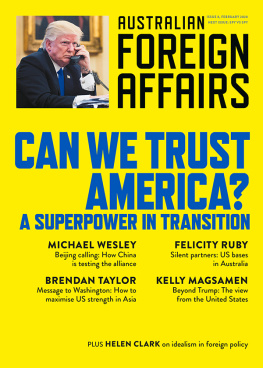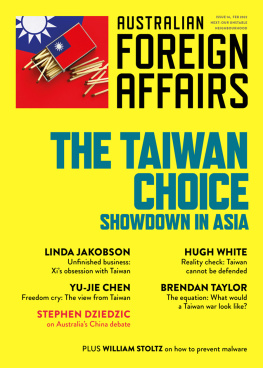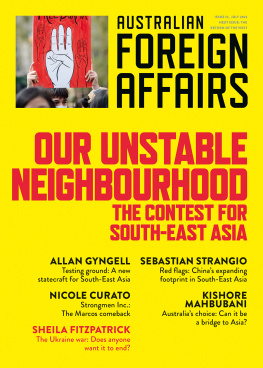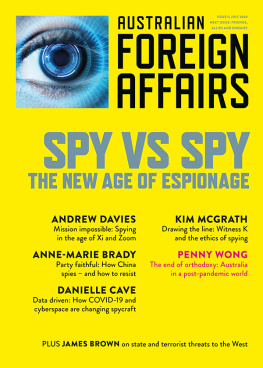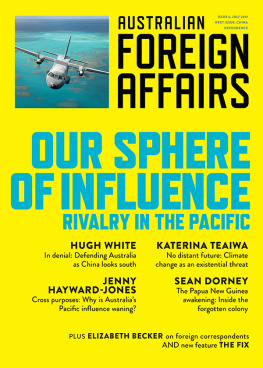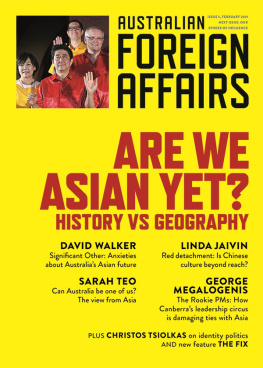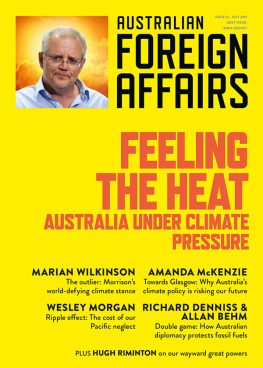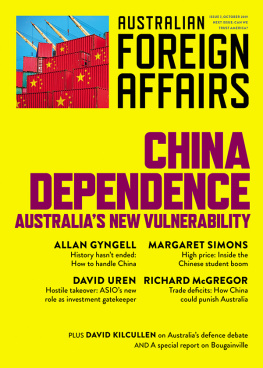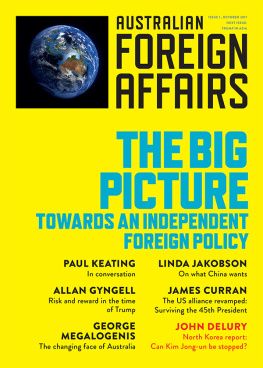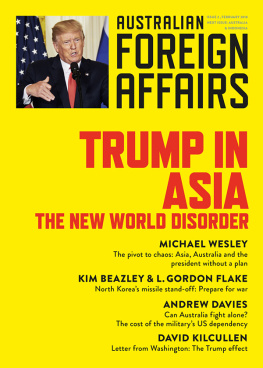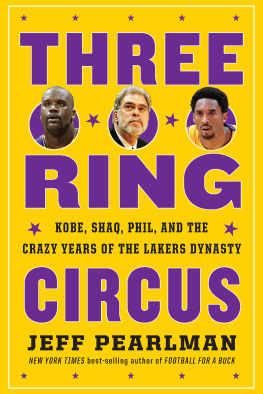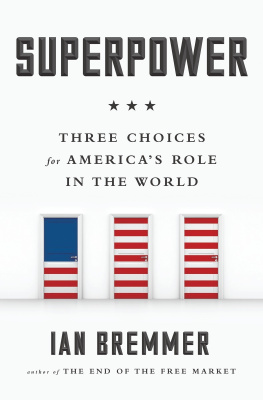Australian Foreign Affairs is published three times a year by Schwartz Books Pty Ltd. Publisher: Morry Schwartz. ISBN 978-1-74382-1251 ISSN 2208-5912 ALL RIGHTS RESERVED. No part of this publication may be reproduced, stored in a retrieval system, or transmitted in any form by any means, electronic, mechanical, photocopying, recording or otherwise, without the prior consent of the publishers. Essays, reviews and correspondence retained by the authors. Subscriptions 1 year print & digital auto- renew (3 issues): $49.99 within Australia incl. GST. 1 year print and digital subscription (3 issues): $59.99 within Australia incl. GST. 2 year print & digital (6 issues): $114.99 within Australia incl. GST. 1 year digital only auto-renew: $29.99. Payment may be made by MasterCard, Visa or Amex, or by cheque made out to Schwartz Books Pty Ltd. Payment includes postage and handling. To subscribe, fill out the form inside this issue, subscribe online at Editor: Jonathan Pearlman. Associate Editor: Chris Feik. Consulting Editor: Allan Gyngell. Deputy Editor: Julia Carlomagno. Digital Editor and Marketing: Georgia Mill. Editorial Intern: Lachlan McIntosh. Management: Elisabeth Young. Subscriptions: Iryna Byelyayeva. Publicity: Anna Lensky. Design: Peter Long. Production Coordination: Marilyn de Castro. Typesetting: Akiko Chan. Cover photograph by Newscom/Alamy Stock Photo.
Contributors
John Blaxland is a professor of security and intelligence studies at the Strategic and Defence Studies Centre at the Australian National University.
Jacinta Carroll is a senior research fellow at the National Security College at the Australian National University.
Helen Clark is a former prime minister of New Zealand.
Christopher Kremmer is a journalism lecturer at the University of New South Wales whose books include Inhaling the Mahatma.
Kelly Magsamen is the vice president for national security and international policy at the Center for American Progress and was previously a senior Pentagon and National Security Council official.
Felicity Ruby is a PhD candidate at the University of Sydney who is researching the Five Eyes intelligence alliance.
Brendan Taylor is a professor of strategic studies at the Australian National University.
Michael Wesley is the deputy vice-chancellor international at the University of Melbourne.
Editors Note
CAN WE TRUST AMERICA?
In February 1998, seven years after the Soviet Union collapsed and several months before Google was founded, Madeleine Albright, the US secretary of state, appeared on morning television to discuss recent tensions in Iraq. The United States accounted for 30 per cent of the global economy and 40 per cent of the worlds defence spending; the second-biggest military spender was France. If we have to use force, Albright explained, it is because we are America.
Famously, Albright then introduced her description of America as the indispensable nation, a label suggested to her by a White House aide, who had coined it with a historian.
We are the indispensable nation, Albright said. We stand tall and we see further than other countries into the future.
Back then, this assertion of unassailability seemed indisputable, not just to viewers of NBCs The Today Show but to the international community. Australia, for instance, in its 1997 Foreign Policy White Paper, stated: The United States will remain, over the next fifteen years, the single most powerful country in the world. In its 2003 Foreign Policy White Paper, it said: No other country can match the United States global reach in international affairs.
Albrights comment also contained a presumption implicit in the tone that the reason for the United States indispensable status was not only its contribution to the worlds prosperity, security, innovation and culture, but also the superiority of its values and vision.
Today, Albrights truths no longer seem so self-evident. The United States has weathered two inconclusive wars in Iraq and Afghanistan; the global financial crisis has weakened faith in its economic leadership; and partisanship in Washington has paralysed its policymaking. China has emerged as a rising rival power, while Russia and others have tested US power elsewhere.
In 2017, Australia, in its first Foreign Policy White Paper since 2003, claimed: The United States remains the most powerful country, but its long dominance of the international order is being challenged by other powers. A postCold War lull in major power rivalry has ended.
Australia has benefited from the stability in Asia the US presence guaranteed, and from being a staunch ally of the worlds unrivalled superpower. Now, in the wake of the postCold War lull, Australia will no longer be able to view the alliance as a cosy and ever-dependable security blanket. Washingtons demands of Canberra are already changing.
Aside from the emergence of rival powers, other changes have occurred within the United States, where the consensus around its global role appears to be diminishing. Barack Obama and Hillary Clinton used the phrase indispensable nation; Donald Trump does not, and nor do several of the front-running Democratic presidential candidates.
The United States role and self-image may be in flux, yet its power and reach remain immense. It is the worlds strongest and wealthiest country. The costs it faces in trying to remain indispensable are growing, but the benefits are no longer guaranteed. So its choices over its future role in Asia, and its approach to its allies are becoming less straightforward.
For Australia, this presents serious challenges. It has been able to avoid difficult choices because the US place in the world, and particularly in Asia, was so assured. In this world beyond the lull, Australia will need to understand and anticipate the United States options and capabilities. This will be crucial if Australia is to maintain confidence in its closest ally, in a region in which a growing number of nations can claim to be indispensable.
Jonathan Pearlman
BEIJING CALLING
How China is testing the alliance
Michael Wesley
On 20 August 1908, half a million of Sydneys 600,000 people crushed in around the shores of Sydney Harbour. It was the largest public gathering ever in Australia, easily overshadowing the celebrations for Federation seven years before. They were there to see sixteen white battleships of the United States Navy stopping in as part of a global circumnavigation.
Prime minister Alfred Deakin had irritated Australias imperial ally by directly inviting the US Navy to visit, rather than routing his request through Whitehall. Deakins letter of invitation to American president Theodore Roosevelt on 7 January 1908 had a strategic motive. Australia was locked into an arrangement to pay 200,000 per year towards the British Navy, yet the portion of the imperial fleet stationed in Australian waters was insignificant and could be withdrawn without consultation.
Even more alarming, Britain had admitted its impotence in the Pacific by forming an alliance with imperial Japan in 1902. To the British government, the alliance made splendid sense: both nations were concerned about Russia, and Japan had modelled its burgeoning navy on Britains, so Britain felt comfortable subcontracting its imperial interests in the Far East to the Japanese Navy. It was a strategic logic lost on Australians, who were alarmed by Japans rising power and growing territorial demands. By subcontracting the defence of the Empires Pacific territories to Japan, Deakin thought, the British government had given the fox responsibility for the henhouse. He wanted to build Australias own navy and thought that a visit by a powerful American flotilla may embarrass Whitehall into accepting his case.

